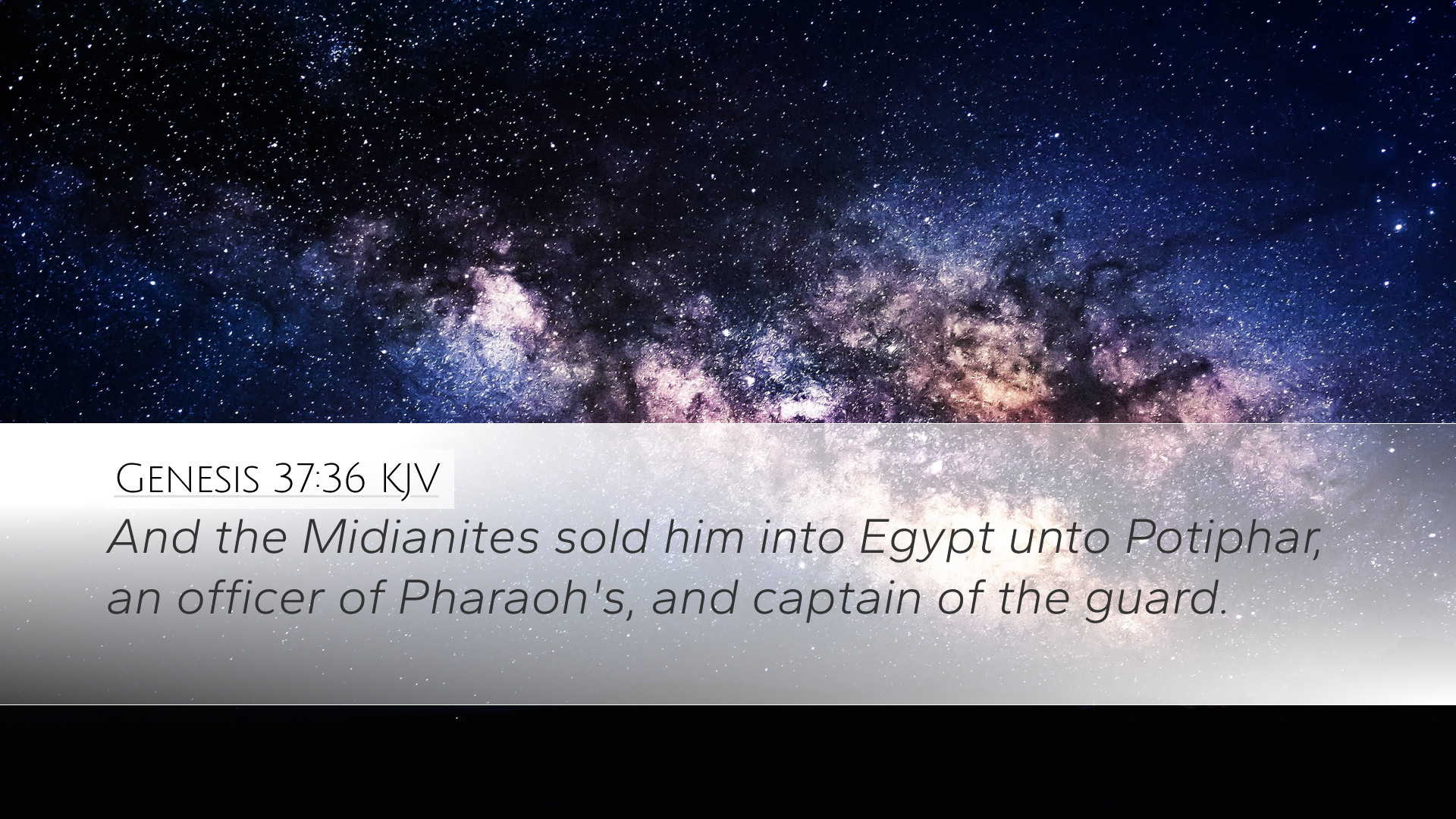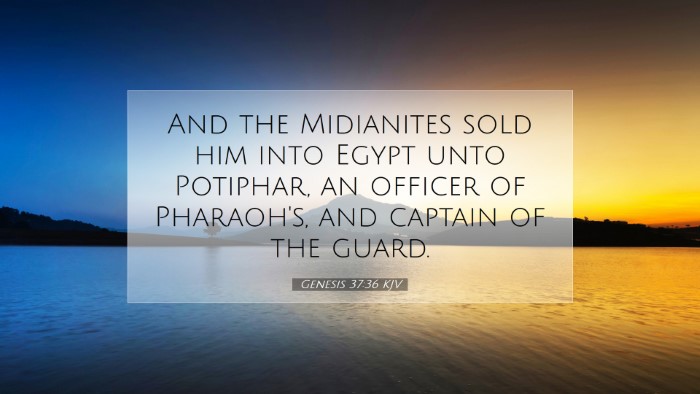Commentary on Genesis 37:36
Genesis 37:36 states: "And the Midianites sold him into Egypt unto Potiphar, an officer of Pharaoh's, and captain of the guard." This pivotal verse marks a significant turn in the narrative of Joseph, who transitions from a favored son to a captive servant. Various public domain commentaries provide insights into the implications and theological significance of this moment in Scripture.
Contextual Analysis
The events leading to Genesis 37:36 involve Joseph being sold by his brothers. His coat of many colors, a symbol of his father's favoritism, becomes both his downfall and a catalyst for divine purpose. The selling of Joseph into slavery introduces key themes of betrayal, providence, and eventual redemption.
Insights from Matthew Henry
Matthew Henry emphasizes the sovereignty of God in this dark moment of Joseph's life. He writes that God uses the actions of Joseph's brothers to fulfill a greater purpose. The Midianites’ involvement is not an accident; rather, it showcases God's intricate planning. Henry asserts that this event prepares Joseph for his future role in Egypt and the survival of his family during the famine.
God's Sovereignty
Henry suggests that even in betrayal and hardship, God is actively working. The transition from Canaan to Egypt is essential for Joseph’s eventual rise to power and his family's salvation. The Midianites, rather than being mere traffickers, are instruments in God’s divine plan.
Lessons on Providence
Joseph’s ordeal serves as a reminder that God can turn evil intentions into good outcomes. Henry notes that believers should comfort themselves with the belief that all things, even injustices, are under God's control.
Insights from Albert Barnes
Albert Barnes highlights the significance of the names involved, particularly 'Potiphar', whose name means 'he whom Ra has given', suggesting an Egyptian context and further emphasizing God's providential hand in Joseph's life.
Potiphar's Role
Barnes emphasizes that Potiphar being "captain of the guard" positions Joseph within the royal sphere of influence, setting the stage for future events in the narrative. He states that God’s providential care ensures that Joseph ends up in a place where he is prepared for leadership, despite the dire circumstances of his sale into slavery.
Theological Considerations
Barnes also raises the question of free will versus divine determinism in the actions of Joseph's brothers. While their actions were wicked, God allowed these choices to unfold to achieve His divine purposes.
Insights from Adam Clarke
Adam Clarke provides an exegetical view on the terms used in the verse, focusing on the identity of the Midianites and their role in the events. Clarke notes that the Midianites had a trading culture, which aligns with the dynamics of the ancient Near Eastern economy.
The Cultural Perspective
Clarke remarks on how the interaction with the Midianites reflects larger themes of commerce and survival in a harsh world. Their involvement indicates not only the precarious position of Joseph but also the realities of social transactions in that era.
Spiritual Implications
Clarke also points to the spiritual implications of Joseph's suffering. He draws parallels with the New Testament, suggesting Joseph's unjust suffering foreshadows the ultimate suffering of Christ, leading to redemption and reconciliation.
Overall Theological Themes
The narrative surrounding Genesis 37:36 incorporates key theological themes that resonate with Christians today:
- Divine Providence: God’s hand orchestrates events for the fulfillment of His plans, even amidst human failings and malice.
- Suffering and Preparation: Joseph's suffering is not without purpose; it is preparation for future leadership and reconciliation.
- Faithfulness in Trials: Readers are encouraged to remain steadfast in faith during trials, trusting in God’s overarching plan.
- The Foreshadowing of Redemption: Joseph’s experience serves as a type of Christ, highlighting themes of suffering leading to salvation.
Conclusion
Genesis 37:36 encapsulates a moment of despair that transforms into a divine setup for future glory. The insights gleaned from Matthew Henry, Albert Barnes, and Adam Clarke illustrate the multifaceted layers of Joseph's story. For pastors, theologians, and students of the Bible, this verse serves as a reminder of God's sovereignty, the purpose behind suffering, and the assurance of redemption. As we study this verse, let us reflect on the profound ways God works through adversity for His glory and our good.


